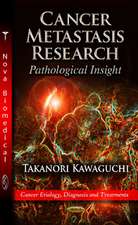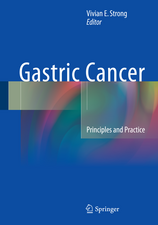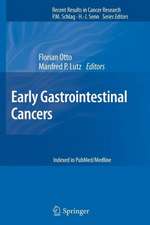Advances in Biology and Therapy of Multiple Myeloma: Volume 1: Basic Science
Editat de Nikhil C. Munshi, Kenneth C. Andersonen Limba Engleză Hardback – 14 noi 2012
| Toate formatele și edițiile | Preț | Express |
|---|---|---|
| Paperback (2) | 1094.44 lei 43-57 zile | |
| Springer – 27 ian 2015 | 1094.44 lei 43-57 zile | |
| Springer – 12 dec 2014 | 1096.25 lei 43-57 zile | |
| Hardback (2) | 1101.21 lei 43-57 zile | |
| Springer – 14 noi 2012 | 1101.21 lei 43-57 zile | |
| Springer – 5 dec 2012 | 1103.03 lei 43-57 zile |
Preț: 1101.21 lei
Preț vechi: 1159.17 lei
-5% Nou
Puncte Express: 1652
Preț estimativ în valută:
210.78€ • 229.03$ • 177.17£
210.78€ • 229.03$ • 177.17£
Carte tipărită la comandă
Livrare economică 21 aprilie-05 mai
Preluare comenzi: 021 569.72.76
Specificații
ISBN-13: 9781461446651
ISBN-10: 1461446651
Pagini: 332
Ilustrații: X, 322 p.
Dimensiuni: 155 x 235 x 23 mm
Greutate: 0.59 kg
Ediția:2013
Editura: Springer
Colecția Springer
Locul publicării:New York, NY, United States
ISBN-10: 1461446651
Pagini: 332
Ilustrații: X, 322 p.
Dimensiuni: 155 x 235 x 23 mm
Greutate: 0.59 kg
Ediția:2013
Editura: Springer
Colecția Springer
Locul publicării:New York, NY, United States
Public țintă
ResearchCuprins
Genomic strategies determining progressions from MGUS to Multiple Myeloma.- Prognostic implication of Genetic changes (Cytogenetics, and FISH, gains and losses of DNA by SNP array and aCGH) in risk stratification in myeloma.- Advances in MM gene expression profiling.- Growth factors in MM.- Role of Wnt signaling pathways in multiple myeloma pathogenesis.- mTOR pathway in multiple myeloma.- Jak/STAT signaling in the pathogenesis and treatment of multiple myeloma.- Role of extracellular matrix in myeloma biology.- Osteoclasts: Potential target for blocking microenvironmental support of myeloma.- Targeting the BAFF/APRIL cytokine network in multiple myeloma.- Role of Osteoblast in myeloma pathology.- Migration and homing in Multiple Myeloma.- Genes and proteins of myeloma endothelial cells to search specific targets of the tumor vasculature.- Epigenetic regulation of myeloma within its bone marrow microenvironment.- Targeting mulitple myeloma tumor angiogenesis: focus on VEGF.- Novel in vivo model in myeloma.- Index.
Textul de pe ultima copertă
Despite the advances in conventional, and novel agent and high dose chemotherapy, multiple myeloma remains incurable. In order to overcome resistance to current therapies and improve patient outcome, novel biologically-based treatment approaches are being developed. Current translational research in multiple myeloma focusing on the development of molecularly-based novel targeted single-agent and combination therapies has great promise to achieve high frequency and durable responses in the majority of patients.
This volume will focus on biology of multiple myeloma, especially on oncogenomic changes, cell signaling pathways and intermediate molecules that are being investigated for development of novel therapies. The book will present newer developments, providing an emphasis on basic science, as well as its significant clinical impact.
This volume will focus on biology of multiple myeloma, especially on oncogenomic changes, cell signaling pathways and intermediate molecules that are being investigated for development of novel therapies. The book will present newer developments, providing an emphasis on basic science, as well as its significant clinical impact.
Caracteristici
Focuses on biology of MM especially, oncogenomic changes, cell signaling pathways and intermediate molecules that are being investigated for development of novel therapies
Explores all clinically important targets including those which have either therapeutic or prognostic significance
Provides perspective on new developments and information with emphasis both on basic science as well as its clinical impact
Includes supplementary material: sn.pub/extras
Explores all clinically important targets including those which have either therapeutic or prognostic significance
Provides perspective on new developments and information with emphasis both on basic science as well as its clinical impact
Includes supplementary material: sn.pub/extras









